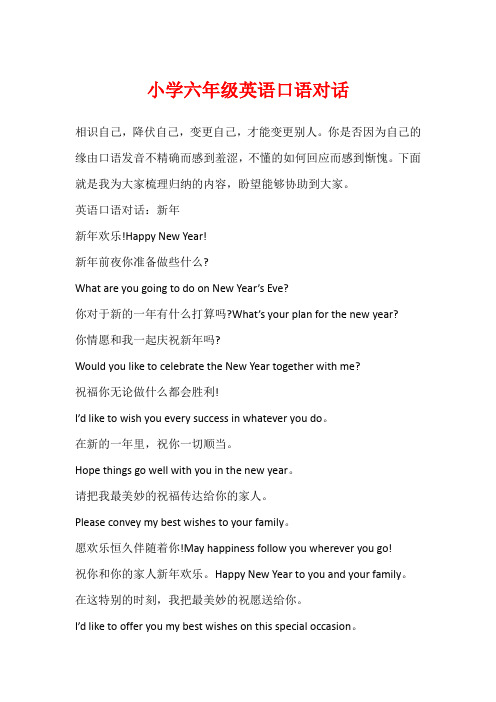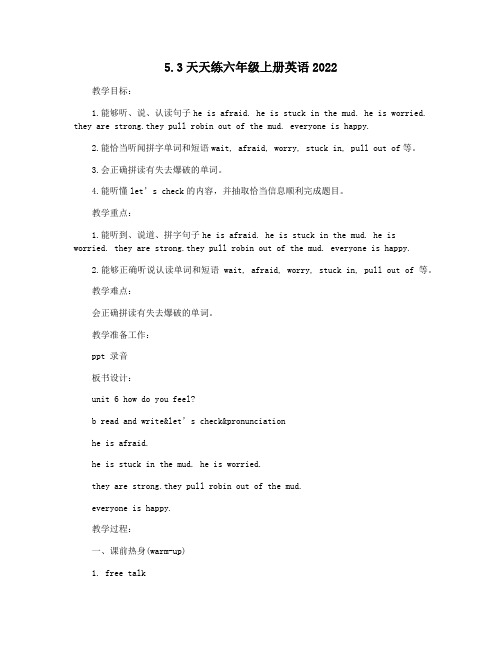小学六年级英语口语天天练
小学六年级英语口语对话

小学六年级英语口语对话相识自己,降伏自己,变更自己,才能变更别人。
你是否因为自己的缘由口语发音不精确而感到羞涩,不懂的如何回应而感到惭愧。
下面就是我为大家梳理归纳的内容,盼望能够协助到大家。
英语口语对话:新年新年欢乐!Happy New Year!新年前夜你准备做些什么?What are you going to do on New Year’s Eve?你对于新的一年有什么打算吗?What’s your plan for the new year?你情愿和我一起庆祝新年吗?Would you like to celebrate the New Year together with me?祝福你无论做什么都会胜利!I’d like to wish you every success in whatever you do。
在新的一年里,祝你一切顺当。
Hope things go well with you in the new year。
请把我最美妙的祝福传达给你的家人。
Please convey my best wishes to your family。
愿欢乐恒久伴随着你!May happiness follow you wherever you go!祝你和你的家人新年欢乐。
Happy New Year to you and your family。
在这特别的时刻,我把最美妙的祝愿送给你。
I’d like to offer you my best wishes on this special occasion。
愿您在新的一年里快欢乐乐。
Much joy to you in the upcoming year。
愿您在一年里华蜜欢乐。
Wish you happiness now and throughout the year。
我也同样祝愿你。
Same to you。
英语口语对话:感恩节阿门。
Amen。
六年级英语口语表演单选题30题

六年级英语口语表演单选题30题1. You meet your classmate in the morning. What do you say?A. Good afternoon!B. Good evening!C. Good morning!答案解析:C。
早上见到同学应该说“Good morning!”。
A 选项“Good afternoon!”是下午问好;B 选项“Good evening!”是晚上问好。
2. Your teacher asks you how you are. What's your answer?A. I'm fine, thank you.B. I'm ten.C. I'm a student.答案解析:A。
老师问“How are you?”,应该回答“I'm fine, thank you.”。
B 选项“I'm ten.”是回答年龄;C 选项“I'm a student.”是回答职业身份。
3. You want to introduce yourself. What do you say first?A. Hello! I'm...B. Goodbye!C. Nice to meet you!答案解析:A。
介绍自己首先要说“Hello! I'm...”。
B 选项“Goodbye!”是告别语;C 选项“Nice to meet you!”是初次见面时说的话。
4. You see a new student in your class. What do you say?A. Who are you?B. What's your name?C. How old are you?答案解析:B。
看到新同学应该问“What's your name?”。
A 选项“Who are you?”比较不礼貌;C 选项“How old are you?”是问年龄。
六年级英语口语交际单选题30题答案解析版

六年级英语口语交际单选题30题答案解析版1.Hi! Nice to see you!A. Nice to see you, too!B. Hello!C. Goodbye!答案:A。
在日常问候中,当别人说“Nice to see you!”时,通常回复“Nice to see you, too!”。
B选项“Hello!”只是一般性的打招呼,不是对这句话的合适回应。
C选项“Goodbye!”是告别用语,不符合此时语境。
2.How are you?A. I'm fine, thank you.B. How are you?C. I'm ten.答案:A。
当别人问“How are you?”时,常用“I'm fine, thank you.”来回答。
B选项是重复问题,不是正确回答。
C选项“I'm ten.”是回答年龄,与问题不对应。
3.Good morning!A. Good afternoon!B. Good evening!C. Good morning!答案:C。
别人说“Good morning!”时,回应“Good morning!”。
A 选项“Good afternoon!”是下午好,B选项“Good evening!”是晚上好,都不符合此时语境。
4.What's your name?A. I'm Lily.B. She is Lily.C. He is Lily.答案:A。
问“What's your name?”回答用“I'm+名字”。
B选项“She is Lily.”是介绍女性她是莉莉,C选项“He is Lily.”是介绍男性他是莉莉,都不符合问自己名字的语境。
5.This is my friend, Tom.A. Hello, Tom!B. Nice to meet you, Tom!C. Goodbye, Tom!答案:B。
小学6年级英文单词练习题每日一练70

109.(?un)
字母:___中文:____
110.(Adm?re)
字母:___中文:____
111.(Aff?ct)
字母:___中文:____
112.(C?eer)
字母:___中文:____
113.(B?gin)
字母:___中文:____
114.(Accep?)
字母:___中文:____
字母:___中文:____
90.(R?oster)
字母:___中文:____
91.(Avera?e)
字母:___中文:____
92.(Dus?)
字母:___中文:____
93.(Bre?d)
字母:___中文:____
94.(Ac?ual)
字母:___中文:____
95.(Go?t)
字母:___中文:____
38.(Discu?s)
字母:___中文:____
39.(Tissue?ox)
字母:___中文:____
40.(Pa?rot)
字母:___中文:____
41.(M?untain)
字母:___中文:____
42.(?ssociate)
字母:___中文:____
43.(B?ll)
字母:___中文:____
字母:___中文:____
103.(B?ll)
字母:___中文:____
104.(Pengu?n)
字母:___中文:____
105.(Delic?ous)
字母:___中文:____
106.(?asual)
字母:___中文:____
107.(Appli?ation)
口语天天练日常英语作文

口语天天练日常英语作文 Title: The Importance of Daily Practice in Improving Spoken English。
Mastering spoken English is a journey that requires consistent effort and practice. Just like any skill, regular practice plays a crucial role in enhancing one's ability to communicate effectively in English. In this essay, we will explore the significance of daily practice in improving spoken English skills.
First and foremost, daily practice helps individuals become more fluent in spoken English. Fluency is the ability to express oneself smoothly and effortlessly. By engaging in daily conversations, whether it's with friends, family, or even practicing alone, individuals can develop a natural flow in their speech. Repetition of language patterns and expressions reinforces learning and contributes to fluency. Moreover, daily practice enhances vocabulary acquisition. The more exposure one has to English words and phrases, the richer their vocabulary becomes. Through daily conversations, reading, and listening activities, individuals encounter new words in various contexts, allowing them to understand their meanings and usage more effectively. Additionally, actively incorporating new vocabulary into daily speech helps solidify retention and integration into one's linguistic repertoire.
5.3天天练六年级上册英语2022

5.3天天练六年级上册英语2022教学目标:1.能够听、说、认读句子he is afraid. he is stuck in the mud. he is worried. they are strong.they pull robin out of the mud. everyone is happy.2.能恰当听闻拼字单词和短语wait, afraid, worry, stuck in, pull out of等。
3.会正确拼读有失去爆破的单词。
4.能听懂let’s check的内容,并抽取恰当信息顺利完成题目。
教学重点:1.能听到、说道、拼字句子he is afraid. he is stuck in the mud. he is worried. they are strong.they pull robin out of the mud. everyone is happy.2.能够正确听说认读单词和短语wait, afraid, worry, stuck in, pull out of等。
教学难点:会正确拼读有失去爆破的单词。
教学准备工作:ppt 录音板书设计:unit 6 how do you feel?b read and write&let’s check&pronunciationhe is afraid.he is stuck in the mud. he is worried.they are strong.they pull robin out of the mud.everyone is happy.教学过程:一、课前热身(warm-up)1. free talkt: good morning, boys and girls.ss: good morning, teacher.t: how do you feel today?ss: i am … thanks.t: nice to see you.ss: nice to see you, too.2. 教师播放歌曲“if you’re happy, clap your hands”的录音,全班学生跟著录音唱歌曲,活跃课堂气氛。
5.3天天练小学英语六年级下册期末测试(二)

5.3天天练小学英语六年级下册期末测试(二)【听力试题选项】第一部分听力(共两节,满分30分)做题时,先将答案标在试卷上。
录音内容结束后,你将有两分钟的时间将试卷上的答案转涂到答题卡上。
第一节(共5小题;每小题1.5分,满分7. 5分)听下面5段对话。
每段对话后有一个小题,从题中所给的A、B、C三个选项中选出最佳选项。
听完每段对话后,你都有10秒钟的时间来回答有关小题和阅读下一小题。
每段对话仅读一遍。
例:How much is the shirt?A. £19.15.B.£9.18.C.£9.15.答案是C。
1.Why did the woman go to Mallorca?A.To teach Spanish.B.To look for a job.C.To see a friend.2.What does the man ask the woman to do?A.Take him to hospital.B.Go to a class with him.C.Submit a report for him.3.Who will look after the children?A.JenniferB.SuzyC.Marie.4.What are the speakers going to do?A.Drive home.B.Go shopping.C.Eat out.5.What are the speakers talking about?A.How to fry fish.B.How to make coffee.C.How to remove a bad smell.第二节(共15小题,每小题1.5分,满分22.5分)听下面5段对话或独白。
每段对话或独白后有几个小题,从题中所给的A、B、C三个选项中选出最佳选项。
听每段对话或独白前,你将有时间阅读各个小题,每小题5秒钟;听完后,各小题将给出5秒钟的作答时间。
六年级英语对话练习单选题40题

六年级英语对话练习单选题40题1. ---How do you do? ---_____A. How are youB. How do you doC. Fine, thank youD. Nice to meet you答案:B。
解析:“How do you do?”是初次见面时的问候语,回答也用“How do you do?”。
A选项“How are you”用于询问对方身体状况或近况;C选项“Fine, thank you”是对“How are you”的回答;D选项“Nice to meet you”用于初次见面时表达很高兴见到对方,但不是“How do you do”的回答。
2. ---Hello, Tom. This is my sister, Mary. ---_____A. How are you, MaryB. Nice to meet you, MaryC. Are you MaryD. How old are you, Mary答案:B。
解析:当别人介绍新的人物给你认识时,常用“Nice to meet you”来表示很高兴见到对方。
A选项“How are you”是询问身体状况或近况;C选项“Are you Mary”是询问对方是否是Mary,不符合这种介绍场景;D选项“How old are you”是询问年龄,也不适合这种初次见面的介绍场景。
3. ---Good morning, boys and girls. ---_____A. Good afternoonB. Good morningC. Good eveningD. Good night答案:B。
解析:“Good morning”的回答也用“Good morning”,这是早上见面时的问候语。
A选项“Good afternoon”是下午的问候语;C 选项“Good evening”是晚上的问候语;D选项“Good night”是晚安的表达,用于睡觉前。
- 1、下载文档前请自行甄别文档内容的完整性,平台不提供额外的编辑、内容补充、找答案等附加服务。
- 2、"仅部分预览"的文档,不可在线预览部分如存在完整性等问题,可反馈申请退款(可完整预览的文档不适用该条件!)。
- 3、如文档侵犯您的权益,请联系客服反馈,我们会尽快为您处理(人工客服工作时间:9:00-18:30)。
小学六年级英语口语天天练
●从起床到出门
早晨好!
Good morning.
Good morning, John. (早晨好,约翰。)
Good morning, mom. (早晨好,妈妈。)
闹钟响了吗?
Did the alarm clock go off? go off是闹钟“响”的意思。
Did the alarm clock buzz?
Did the alarm clock ring?
该起床了!
It's time to get up!
It's time to get up! (该起床了!)
I don't wanna get up. (我真不想起。)
It's time to wake up!
It's time to get out of bed.
It's time to get ready.
快点儿起床!
Get up soon.
Get up soon. (快点儿起床!)
I don't want to. (我真不想起。)
你醒了吗?
Are you awake? get up是动词,表示“起床”、“起”的动作。awake是形
容词,表示“醒了”、“没睡”的状态。
Are you awake? (你醒了吗?)
I am now. (我刚醒。)
你不舒服吗?
Are you feeling sick?
Are you feeling sick? (你不舒服吗?)
No, I'm just tired. (没有,只是有点儿累。)
睡得好吗?
Did you sleep well?
Did you sleep well? (睡得好吗?)
Yes, I slept very well. (嗯,睡得挺好。)
Did you sleep well? (睡得好吗?)
No, I couldn't fall asleep. (哪儿啊,几乎没睡着。)
能帮我关掉闹钟吗?
Would you turn off the alarm clock?
Please turn off the alarm clock. (请把闹钟关了。)
你终于起来了。
You finally got up.
You finally got up. (你终于起来了。)
I'm still sleepy. (我还困着呢!)
今天是个好天!
It's a nice day!
It's a nice day! (今天是个好天!)
It sure is. (是不错啊。)
It's a beautiful day!
It's a wonderful day!
It's a great day!
昨晚你熬夜了?
Did you stay up late last night? stay up late“睡得晚”、“熬夜”。
Did you go to bed late last night?
把被子叠好。
Let's fold up the futon. fold意为“折叠”,fold up意为“叠好”、
“叠整齐”;futon原本是日文,现在英文中也逐渐使用,意为“被子”。
Let's put the futon away. (把被子收起来吧。)
昨天晚上你打呼噜了。
You were snoring last night. snore“打呼噜”。
You were snoring last night. (昨天晚上你打呼噜了。)
Did I keep you up? (影响你睡觉了吗?)
You were sawing logs last night. saw logs原意为“锯木头”,在此用来
表示“打呼噜”。
我做了个可怕的梦。
I had a nightmare.
I had a nightmare. (我做了个可怕的梦。)
It's all right now. (现在没事了。)
你一直没关灯啊。
You left the light on. left (leave)是“保持某种样子”、“保持某种状
态”的意思,表达“电灯一直开着”、“发动机一直开着”、“窗户一直开着”也
可以用这种句型。
You forgot to turn off the light. (你忘了关灯了。)
我得洗脸了。
I have to go wash my face. go wash是go和wash两个动词连用,口语中
常用。可以把它看作是go and wash的缩略形式。
